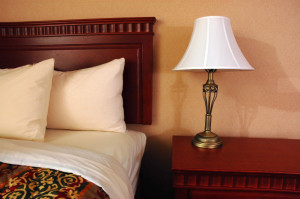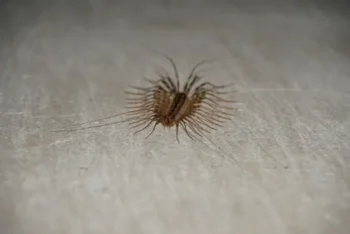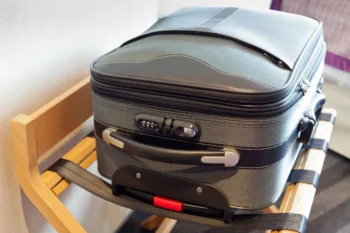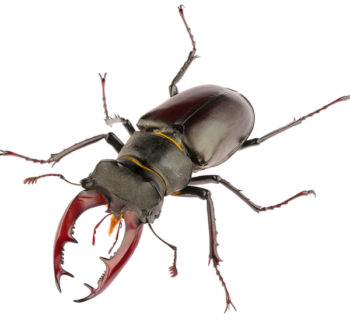
Bed bugs are excellent hitchhikers and travel on your belongings. The more you can minimize your possible contact with them, the less likely it is that you will bring them home with you. With so many people traveling over the summer months, we at Griffin Pest Solutions thought it best to offer a few travel tips to help reduce your risk of getting bed bugs.
14 Tips to Avoid Bed Bugs During Your Travels
-
- Do your research.
Before you book your hotel, check online to see if anyone has posted bed bug issues at your hotel. If they have, choose another hotel. Just because your hotel is not listed, does not mean they are without bed bugs. They may still have an issue, but no one has posted anything yet.
-
- Invest in hard-shell luggage.
Bed bugs have a harder time clinging to smooth, hard surfaces compared to fabric. Opting for a durable, hard-sided suitcase can significantly reduce the likelihood of these pests tagging along.
-
- Consider protective bed covers.
For an extra layer of defense, consider enclosing your suitcase in a protective cover or plastic wrap.
-
- Pack a flashlight.
Griffin Pest Solutions’s entire staff travels with flashlights. It’s your best tool in helping to determine if your hotel room has bed bugs.
When you arrive at the hotel, if possible, leave your luggage in the car when you check in. Take your flashlight and inspect the mattress and bed. Remove the sheets and look for small rust dots (about the size of a pencil eraser head). These will be blood stains. If you see nothing on the mattress, check behind the headboard – and if you can take it off the wall, or shake it, go ahead.
Inform the hotel manager and check out if you see rust spots, insect skins, or insects.
-
- Be vigilant with inspections.
Regularly check the seams, zippers, and corners of your luggage for any signs of bed bugs, such as shells, eggs, or reddish-brown stains. A flashlight can help you spot these elusive pests more effectively.
-
- Keep bags off the floor.
Whether at the airport or in your hotel room, avoid placing your luggage directly on the floor or bed. Utilize luggage racks or elevated surfaces to minimize contact with potential bed bug hiding spots.
-
- Don’t put luggage on the bed.
We don’t recommend putting luggage on the bed, furniture, or luggage rack. Instead, put it in the bathtub. It’s not very convenient, but better safe than sorry.
-
- Seal clothes in plastic.
Before packing, seal your clothing in individual plastic bags or vacuum-sealed containers. This extra layer of protection makes it much more difficult for bed bugs to sneak into your belongings.
-
- Inspect your luggage before entering.
Before bringing your luggage inside your home, conduct a thorough inspection for any signs of bed bugs. Check all seams, pockets, and crevices where they might hide. If you suspect an infestation, leave your luggage outside or in a garage until it can be properly treated.
-
- Don’t bring your luggage immediately into your house.
Once you get home, don’t bring your luggage into your house. You will need to remove everything from your luggage and vacuum thoroughly, inside and out. Vacuum, remove the vacuum bag, seal it tightly in a plastic bag, and throw it in your outside garbage. If you can make a stop at the car wash with a coin-operated vacuum on the way home, do it!
-
- Unpack with caution.
When possible, unpack your luggage outside or in a designated area away from living spaces, such as a garage or laundry room. Avoid unpacking on upholstered furniture or carpeted areas where bed bugs can easily conceal themselves.
-
- Dry your clothes.
Take your zip lock bags and empty them directly into your dryer. Set on the hottest setting and leave clothes in there for at least 30 minutes. Don’t fill the dryer too full. You need the hot air to circulate. Shoes, too, if they can tolerate it (like sneakers).
-
- Wash and dry on high heat.
Wash all clothing, bedding, and linens from your trip in hot water and dry them on the highest heat setting. This will effectively kill any bed bugs or eggs that may have hitchhiked home with you. Consider washing these items separately from your regular laundry to prevent cross-contamination.
-
- Vacuum thoroughly.
Use a vacuum cleaner with a hose attachment to meticulously vacuum the interior and exterior of your luggage, paying close attention to seams, pockets, and folds where bed bugs may hide. After vacuuming, dispose of the vacuum bag or empty the canister contents into a sealed plastic bag outside of your home.
Overall, keep a watchful eye for any signs of bed bug activity in your home, such as bites on your skin, blood stains on bedding, or small dark spots on furniture. If you suspect an infestation in your home, don’t hesitate to contact a licensed bed bug control professional for prompt identification and treatment.
Get Started Today With Griffin!
Avoiding Bed Bugs in Hotels vs Airports vs Flights
While hotels offer comfort and convenience, they’re also prime spots for bed bug infestations thanks to the constant flow of travelers. Even the cleanest establishments aren’t immune since bed bugs are attracted to people, not dirt.
If you suspect bed bugs in your room, alert the hotel staff right away and request a room in a different area of the building, as these pests can quickly spread to adjacent rooms.
Airports and flights also pose a bed bug risk because of the high volume of passengers and the close proximity of seating. With luggage and personal items coming from countless locations, airports are a melting pot for bed bugs. The tight quarters and shared seating on flights create an ideal environment for these pests to spread.
FAQs
Are bed bug travel sprays effective?
These sprays can be effective – and they work by creating a protective barrier that either repels bed bugs or eliminates them upon contact. They are particularly useful when applied to luggage, hotel room furniture, and bedding.
However, it’s important to remember that sprays should be used in conjunction with thorough inspection and preventive measures, such as opting for hard-sided luggage and sealing clothing in airtight plastic bags.
What are the chances of encountering bed bugs in a hotel?
The likelihood of encountering bed bugs in a hotel depends on their history of infestations.
While not all hotels have bed bugs, they can be found in any type of accommodation, from budget-friendly motels to high-end resorts. The frequent turnover of guests in hotels increases the risk of bed bug presence.
To minimize your chances of bringing bed bugs home, thoroughly inspect your hotel room for signs of infestation, such as stains on bedding or discarded bed bug shells.
Can you get bed bugs from air travel?
While less common than getting bed bugs from a hotel, it is still possible to encounter them during air travel. The close proximity of passengers, shared seating, and the movement of luggage can facilitate the transfer of bed bugs from one traveler to another.
To reduce the risk, keep your personal belongings off the floor and thoroughly inspect your luggage when you reach your destination.
How do I make sure my hotel room is bed bug-free?
Before settling into your hotel room, conduct a thorough inspection for signs of bed bugs. Using a flashlight, check the seams of the mattress, headboard, and crevices in furniture. Be on the lookout for reddish-brown stains, small eggs, or shed bed bug shells.
Your Bed Bug Exterminators
This all may seem excessive – but trust us, it is well worth the hassle. These simple steps could save you not only from red, itchy welts, which bed bug bites can cause, but also save you thousands of dollars in bed bug damage costs.
So if you find any signs of bed bugs in your home, bring in the pros at Griffin Pest Solutions. Get started with a free service quote by contacting us today!



